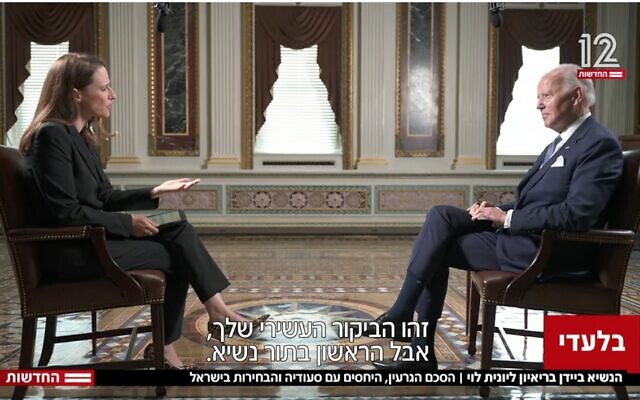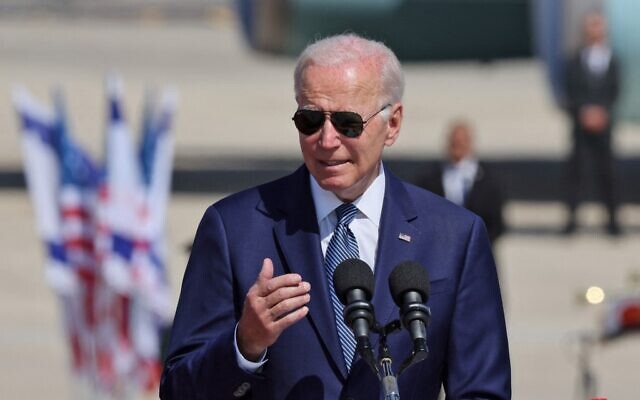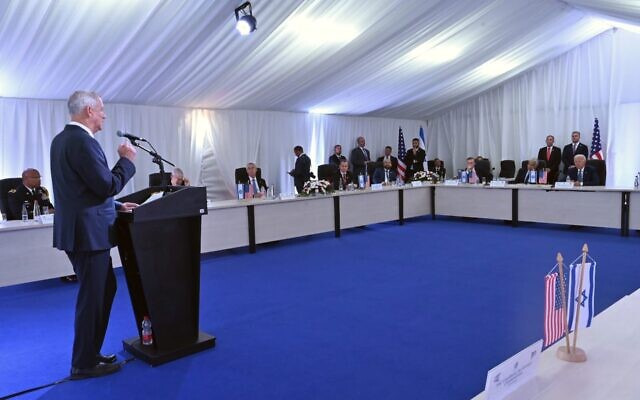Speaking to Channel 12, US president says exiting 2015 nuclear deal was a ‘gigantic mistake’ by Trump; Democrats who call Israel an apartheid state are ‘few’ and ‘wrong’

US President Joe Biden told Israel’s Channel 12 news that he would use force against Iran as a “last resort” to prevent it from obtaining nuclear weapons, but stressed his preference to negotiate with the Iranians instead.
The network’s anchor Yonit Levi interviewed Biden hours before he set off from Washington for his first visit as president to Israel. The interview was broadcast Wednesday evening after Biden had arrived in the Jewish state.
Asked if the US would use force to stop Iran’s nuclear program, Biden replied “as a last resort, yes.”
“Iran cannot get a nuclear weapon,” he said.
Biden explained why he believes the failing 2015 nuclear deal between Iran and world powers should be resurrected, saying that “the only thing more dangerous than the Iran that exists now is an Iran with nuclear weapons.”
It was “a gigantic mistake” for former US president Donald Trump to pull out of the pact, he said. The 2015 agreement, known formally as the Joint Comprehensive Plan of Action, gave Iran relief from sanctions in return for curbs on its nuclear program aimed to prevent it obtaining atomic weapons. It was signed between Iran and the US, UK, France, Russia, China, and Germany.
After Trump exited the JCPOA in 2018 and reinstalled stiff US sanctions, Iran dropped many of its own commitments, ramping up its program and increasing uranium enrichment to a point that experts say puts it close to the threshold of producing a bomb.
“They’re closer to a nuclear weapon now than they were before,” Biden said. But bringing the US back into the pact will enable it to “hold them tight.”

Talks between the remaining signatories to the deal and Iran to revive the JCPOA have stalled, with a key issue said to be Washington’s rejection of Tehran’s demand that its Islamic Revolutionary Guard Corps be removed from the US terror blacklist.
Biden said that the US would walk away from the stalled nuclear talks if returning to the pact was contingent upon removing the IRGC from the roster.
Any agreement for the US to rejoin the deal is “up to Iran now,” Biden said.
Levi asked the president if he received any commitments from Prime Minister Yair Lapid or his recent predecessor Naftali Bennett that Israel would not act alone militarily against Iran’s nuclear sites, as it has threatened, without first notifying the US.
“I’m not going to discuss that,” Biden replied. He also would not speak to possible Israeli involvement in any potential military action by the US to prevent Iran going nuclear.
Biden said he understands Israel’s position, recalling that the late former prime minister Golda Meir once told him that Israel’s secret weapon is that “we have nowhere to go.”
Regarding his four-day trip to the Middle East that will include a stop in Saudi Arabia, Biden said the tour “is about stability in the Middle East.”
The US can’t walk away from the Middle East and let Russia and China “fill the vacuum,” he said.
“It is overwhelmingly in the US interest to have more stability in the Middle East,” Biden said, adding that it is also in Israel’s interest to be more integrated in the region.

Expectation has been building that during the visit an announcement could be made on a significant advance toward normalization between Israel and regional powerhouse Saudi Arabia.
“The more Israel is integrated in the region as an equal and accepted, the more likely there is going to be a means by which they eventually come to an accommodation with the Palestinians down the road,” Biden said.
Regarding Israeli ties with Saudi Arabia, he said “increasing the relationship in terms of acceptance of each other’s presence… it all makes sense to me.”
But he conceded that normalization is “going to take a long time.”
Levi also asked Biden, a Democrat, about members of his party who call Israel an apartheid state and are demanding that military funding for the Jewish state be cut.
More from exclusive @POTUS interview with @N12News: voices in the Democratic Party calling Israel an apartheid state are “few, and they are wrong” pic.twitter.com/CkX3XRkRSL
— Yonit Levi (@LeviYonit) July 13, 2022
“There are a few of them. I think they’re wrong, I think they are making a mistake. Israel is a democracy. Israel is our ally and a friend,” Biden said, adding that “there is no possibility” the Democratic party will turn its back on Israel. He said he would make no apology for billions of dollars in aid to Israel, and additional funding for Iron Dome: “It’s overwhelmingly in our interest that Israel be stable.”
As for a possible reelection matchup against Trump in 2024, Biden said “the one thing I’ve known about politics, and American politics in particular, is that there is no way to predict what is going to happen.”
Biden arrived in Israel Wednesday afternoon and immediately began a hectic agenda during which he will meet various regional leaders for talks.
As reported by The Times of Israel
